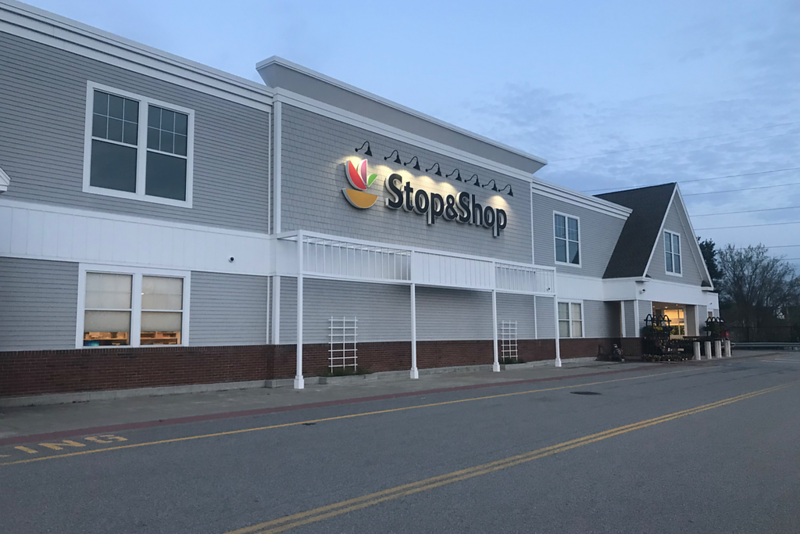Shopping stops at local Stop & Shop
Credit: Joyce Wu
Pictured above is the Stop & Shop situated at the Wayland Town Center. Many Stop & Shop workers were on strike from April 11 to Easter Sunday, protesting the new proposed three-year contract. “It was important to us that people didn’t cross the line,” Stop & Shop worker junior Mia Minasidis said. “A lot of people didn’t get the severity of the changes and what would happen to the 31,000 workers across New England.”
May 2, 2019
Employees of more than 240 Stop & Shop stores went on strike this past April, including workers of the Stop & Shop located in the Wayland Town Center.
After a previous three-year contract expired on Feb. 23, Stop & Shop wrote up a new contract detailing the reduction of pension benefits, paid vacation time, an increase in healthcare premiums and the removal of the extra 50 percent pay workers receive on Sundays and holidays.
This proposed change sparked an immediate backlash from the UFCW, also known as the United Food and Commercial Workers International Union. While Stop & Shop stood behind their proposal, claiming the result of the proposal will be larger paychecks, the union reps argued that although the contract included pay raises, the raises wouldn’t balance out the increased costs of healthcare. The union initiated worker strikes on April 11 in stores across Connecticut, Massachusetts and Rhode Island.
Senior Seth Falber is currently a part-time worker at Stop & Shop and a member of the UFCW. Although most of the changes wouldn’t have much of an impact on Falber himself, he felt that it was important to participate in the strike.
“To me, this strike didn’t matter too much,” Falber said. “I’m a senior who’s going to be gone in a few months. But after hearing some of my fellow workers talk to people about their lives and why they can’t afford these pay cuts, it made me think about the things I have in my life that many don’t.”
Customers of the Stop & Shop in Wayland had mixed reactions to the strike. According to Stop & Shop employee junior Mia Minasidis, customers reactions ranged from being irate with strikers to bringing them food in a show of support.
“A good amount of our regular customers showed support by not crossing the picket line and bringing us donuts, coffees or bagels,” Minasidis said. “There were some people who were actually angry about it, and when we were chanting, they would get angry. And there were also people who would say that they supported us, but that they needed to get something and they would cross the line which really didn’t help the cause.”
Junior Rohini Ramesh is a regular customer at Stop & Shop and showed support for the protesters by choosing not to shop there.
“My friend works there so I was supporting [them] and whatever is best for the workers,” Ramesh said. “I do shop at Stop & Shop so it was difficult for me, but there’s [a] Whole Foods and Target so it was fine.”
A few days after the strike, Stop & Shop and the UFCW voted to ratify a modified tentative contract. The workers are currently back to their regular schedules.
“I think some customers just don’t appreciate the work the [full-time employees] do,” Minasidis said. “They didn’t realize the harm they were doing by actually crossing the picket line. I don’t think a lot of people thought the cause was significant just because most of these workers are [minimum-wage] workers. Some people I know actually talked to me about [the strikes] and asked, ‘Why can’t they just find better jobs?’ They just don’t understand that [the contract] would be affecting these people’s livelihoods.”





![Last Wednesday, the Wayland School Committee gathered to discuss a number of topics regarding the health curriculum and Innovation Career Pathway course. Another large topic of conversation was the ways to potentially mitigate distracting cell phone usage. "These [phones] are going to distract your learning and social relationships," Superintendent David Fleishman said. "That's concrete right there."](https://waylandstudentpress.com/wp-content/uploads/2025/06/Screenshot-2025-06-04-at-9.49.31 PM-1200x886.png)



























![Troy Hoyt finishes the Boston Marathon, running for the Hoyt Foundation. T. Hoyt is the son of Hoyt Foundation CEO Russ Hoyt.
“[Running a marathon] might seem like a big thing, when it’s presented to you at first, but if you break it up and just keep telling yourself, “Yes, you can,” you can start chipping away at it. And before you know it, you’ll be running the whole 26 miles, and you won’t even think twice about it.” T. Hoyt said.](https://waylandstudentpress.com/wp-content/uploads/2025/04/C36E8761-1CBB-452E-9DF2-543EF7B1095E_1_105_c.jpeg)












































